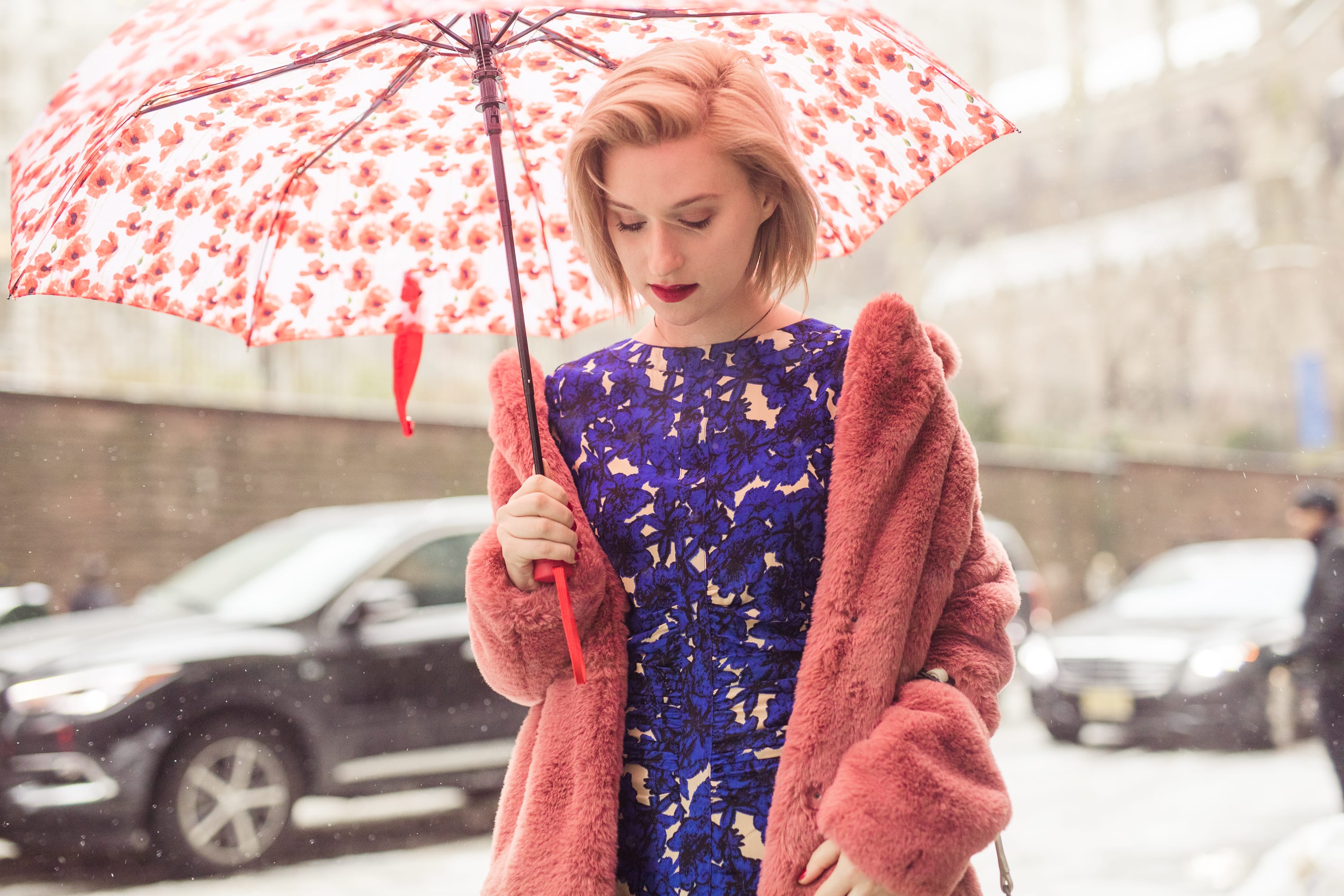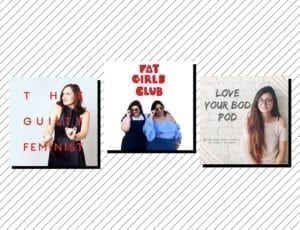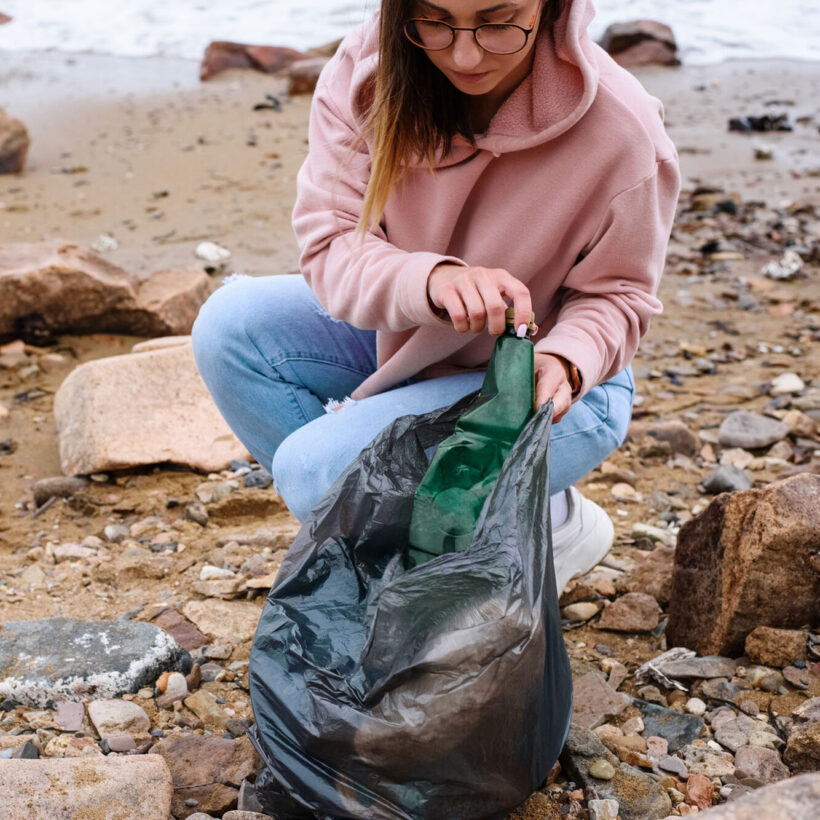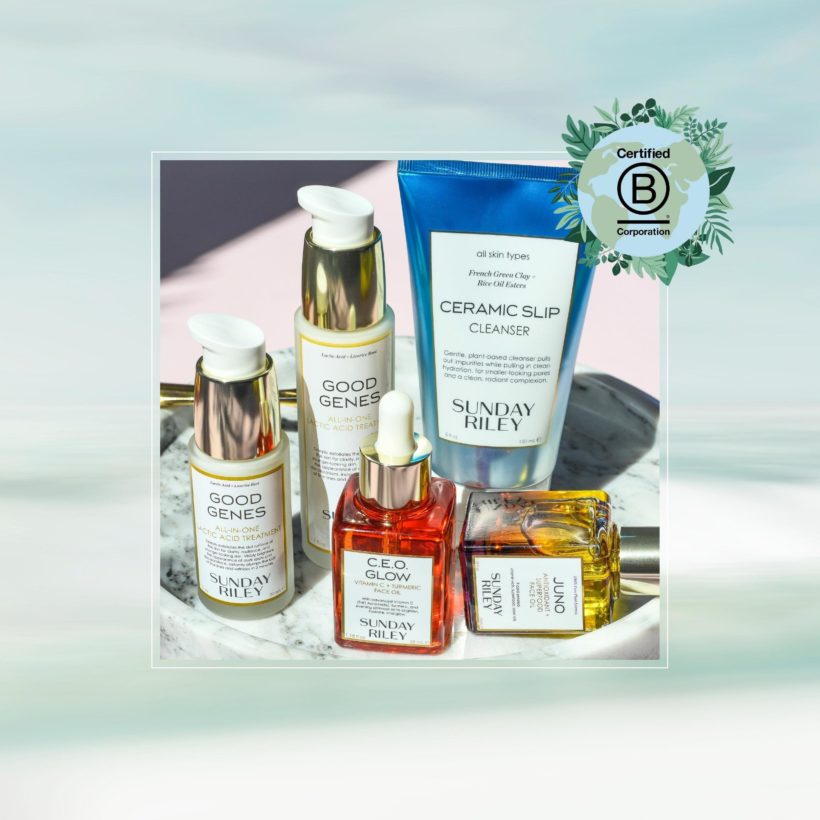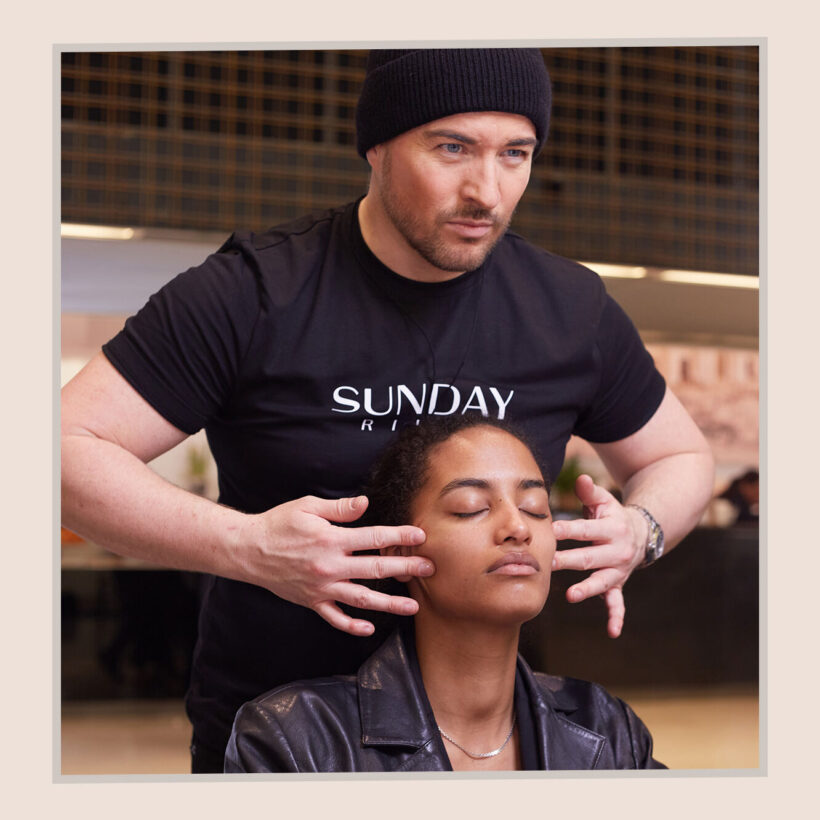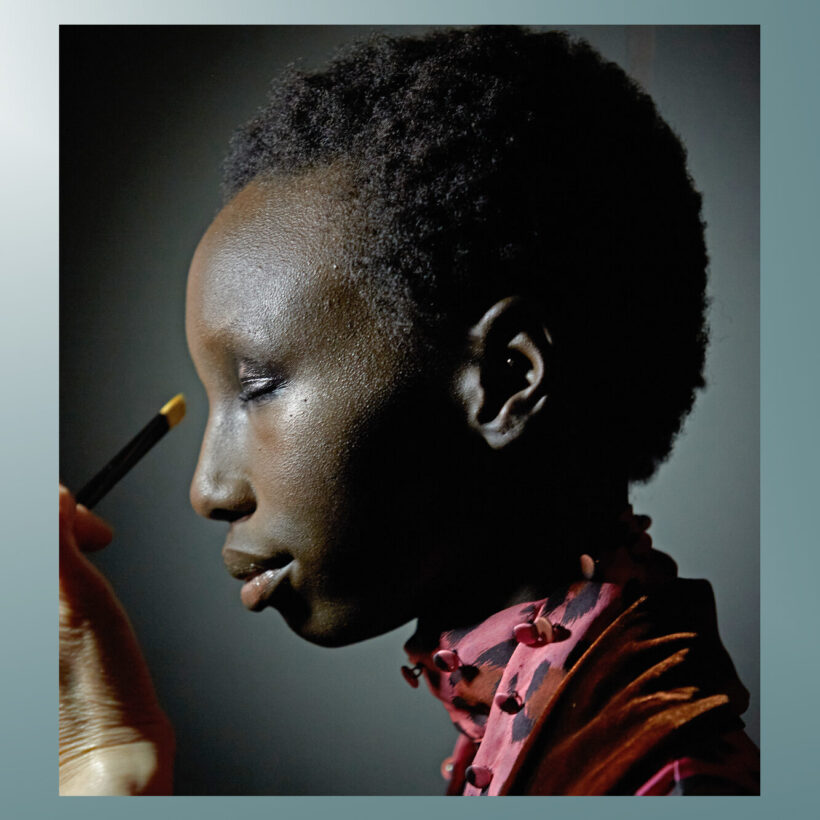I told myself that I was a disruptor, that I was a feminist infiltrator, who was going to take down the system from within.”
This was the mantra that Gabrielle Korn, Nylon’s former editor-in-chief and author of the new memoir Everybody (Else) Is Perfect, silently repeated every day while upwardly climbing in an industry she knew needed a serious makeover — and not the kind that can be achieved with babylights and chemical peels. Korn was just 28 when she was appointed to the fashion and beauty magazine’s top spot; she was Nylon’s youngest and only-ever out lesbian to fill the role. Platinum blonde and routinely costumed in Alexander McQueen ruffled frocks and a different chic plaid suit for every weekday, Korn “passed” among her largely straight, white, thin, social justice-oblivious media contemporaries… but she was a women’s studies graduate and a queer woman, struggling to steer a team (and a whole industry) toward the right side of history, but whose backseat drivers were invisibly controlling the gas and the breaks.
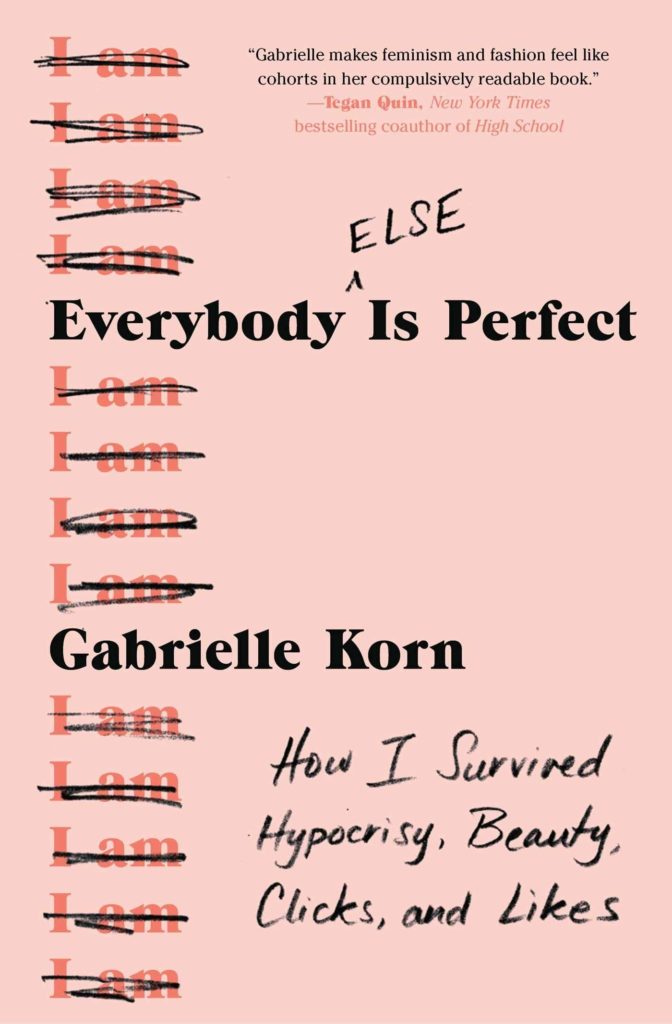
I first met Korn in 2019, while on tour for my first book, Wordslut: A Feminist Guide to Taking Back the English Language. At that point, I was also still working as a full-time beauty editor (a much lower-ranking one, that is). Over inexcusably pricy matcha lattes shared in the lobby of a lower Manhattan coffee-shop-meets-nail-salon, Korn and I happily commiserated over our uniquely contradictory careers as beauty industry drudges moonlighting as feminist authors. We agreed that one day soon, we’d either heroically save the industry from the patriarchy or (more likely) pack up our skincare samples and defect.
If Korn and I weren’t already confidantes after that first meeting, we became so after I read her snappy memoir in essays, which was published by Simon & Schuster in January. The book offers an insidery autopsy of the pseudo-feminist women’s media industry we both ambivalently knew so well, through the lens of Korn’s personal life: Woven through incisive cultural commentary are vulnerable stories of discovering her queerness, navigating romance, overcoming an eating disorder, and simultaneously reckoning with her self-worth as a human and her net-worth as a young editor-in-chief.
Since Korn finished writing her manuscript, she has left beauty and fashion altogether in favor of a job at Netflix, helming content for their LGBTQ+ social media platform, The Most. And — ever closer to the future we daydreamed about that one day in Manhattan — she spends her free time penning feminist Sci-Fi novels.
Read on for my recent conversation with Korn, where we celebrate (and, of course, commiserate over) life as a debut author, the future of the beauty and fashion industries, the skincare products she now spends her own real-life money on, and so much more.
Amanda Montell: So. Your book has been out in the world for a couple months now — how does it feel?
Gabrielle Korn: Mostly, it feels like a relief. I had a very long list of fears leading up to it, and only some of them came true. Overall the response has been really, really nice. I feel really grateful for the support. I also think that when you work really hard on something and then it’s out, it’s also a little bit sad because you can’t work on it anymore.
AM: Totally. Though I’m sure it’s satisfying passing the book into readers’ hands. Like, it’s their book now, which is sad but also the point, ha.
GK: I can’t tell what’s more stressful: People who know me reading it or people who don’t know me reading it, and it turns out, those things are equally stressful. But I’ve gotten a lot of nice messages from strangers as well as people that I haven’t talked to in like 20 years.
AM: You once described your “brand” to me as “someone who hates beauty and fashion, but works in it anyway.” What first drew you to the industry, then what was your first loss of innocence moment where you realized, oh shit, this industry is kind of hateable? And then what kept you going?
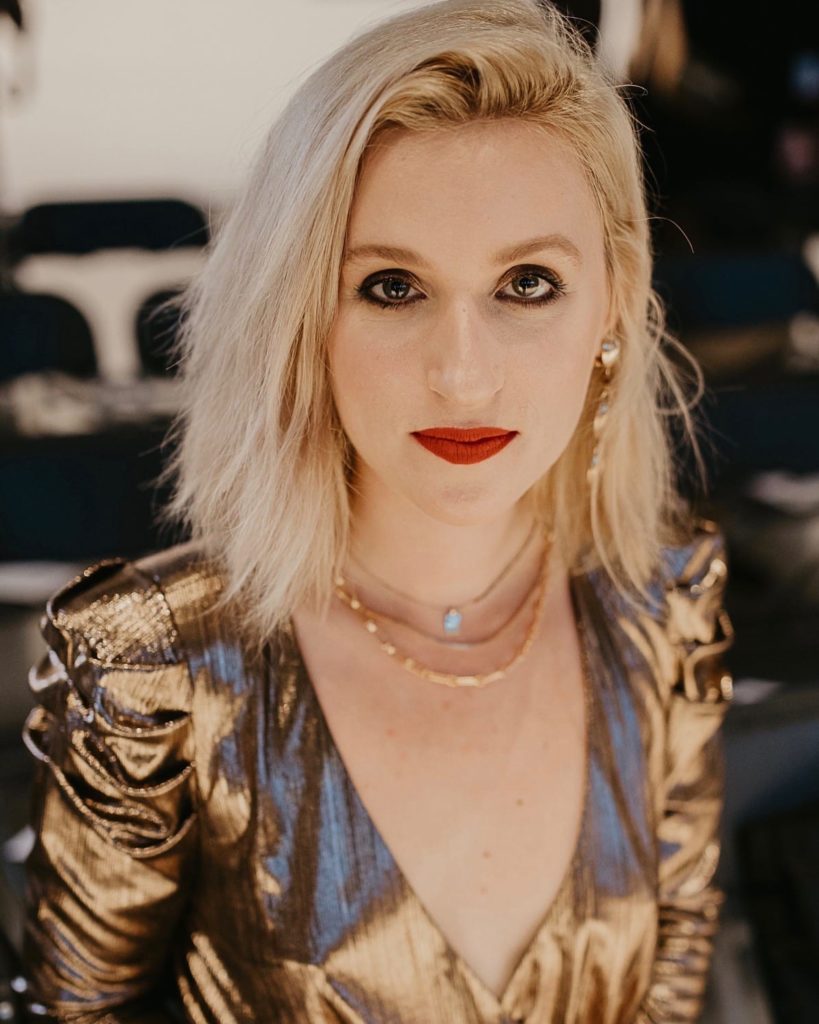
GK: Great questions. It was kind of an accident, honestly. Clothes and makeup and hair have always been very interesting to me, and I have always been kind of good at them in a weird way. But I was a women’s studies major. And then I was working in queer and feminist media, but I really needed to make more money. And Refinery29 was hiring for a production assistant in the beauty department. And my plan was basically like, I can take this job, which is photo research and building posts, and I can do the writing I’m excited about on the side. And then I quickly found out that my non-compete would not allow me to do that.
So I started writing about beauty for Refinery, and it came really naturally to me. I got lucky because I had editors who empowered me to use beauty as a window to talk about the larger issues that I was more interested in pertaining to identity.
But then I had this moment of being assigned a story that was a photoshoot with interviews about women who had embraced their “flaws.” And what ended up happening was it took me six months to cast the story because everyone I proposed for it was rejected for not being conventionally attractive enough. It was like, they basically wanted people who were beautiful in every single way, except one slight thing that was kind of quirky. And I was just like, okay, so we’re saying that we want difference and diversity, but we’re putting parameters around what that difference is allowed to be.
AM: Huge parameters. Like, what they really wanted was Georgia May Jagger with a gap in her teeth.
GK: Really. I found three people who were approved, and two of them were professional models.
AM: I don’t know if the places where you worked used similar euphemisms, but I just remember in like 2015 and 2016, whenever we wanted to use an image of someone who did not fit the white, skinny, blonde, rich-looking mold, it’s not like they would be honest and say, “Oh, like this girl’s a little too thick,” or, “No, we’re really looking for a blonde.” They would say, “Oh, we’re looking for someone a little more elevated,” or, “We’re looking for someone more on brand.” Which is so much worse in a way. Off-brand was like this creepy euphemism to describe just flat-out sexist, fatphobic, white supremacist standards.
GK: Completely. I think that language was used everywhere. Where I worked, too, the word “cool” was used to mean skinny and white.
AM: “Cool-girl” as an adjective. Yes. Okay, so that “flaws” story was a red flag. Then, after discovering so many more problematic parts of the industry, what did you tell yourself in order to be like, “Okay, I can make this job work?” Beyond just, “I need to make money.”
GK: I told myself that I was a disruptor, that I was a feminist infiltrator, who was going to take down the system from within.
AM: And you did in many ways.
GK: Thank you. I tried. I really tried.
AM: What were the scariest parts of writing a book that openly drags an industry you were very much still in at the time? And what were the most joyful, liberating parts about it?
GK: I was really scared of making myself unemployable. Like, if I was too direct about the things that happened that I would make enemies, and those enemies would blacklist me and that would be the end of my career. So it was kind of a blessing that by the time I was wrapping it up, I had left Nylon. And obviously, there are a lot of things that I couldn’t talk about for legal reasons. But I did feel a little bit free to be really honest about what being an editor-in-chief had actually been like since I didn’t have that job anymore. In terms of the joy of it, I mean, it was so satisfying to write the Fashion Week chapter.

AM: I know you believe there’s a special place in hell for Fashion Week.
GK: Yeah. It’s my least favorite institution.
AM: It’s a cult.
GK: Yeah, it is a cult. I just think it’s so bad for so many reasons, and it was so nice to just be like, I’m not going to hold back, I’m just going to go for it. And in the post-publishing period, it’s been nice to have so many people in media and fashion reach out to me and say that they have felt the same way. Months ago, someone who I have always been in spaces with, but who I never really talked to and was always intimidated by, came up to me and said, “I just finished reading your galley. And I want you to know that I’m feeling exactly as you are right now.” And then she walked away and we never spoke again. She didn’t cover the book, and I think she probably couldn’t because of where she works and the things that they have to maintain. But moments like that have been really nice.
AM: That is very validating. So now that you’re out of “women’s media,” how do you personally balance continuing to engage with magazines and products and social media while maintaining a healthy state of mind?
GK: I think I just have a healthy amount of skepticism with the media I consume. Like, if I’m looking at some editor’s fashion market choices, I can probably tell you what publicists they’re friends with based on what their selections are. And that used to make me really annoyed. But now I’m like, well, there’s nothing I can do about it, so whatever. I also think because I’m not in that world, I’m less plugged into the newness cycle. So I’m not super interested in the new trends each season or the best new products each year. I just kind of want to find what works best for me and stick with it. But I do follow stylish people on Instagram and kind of shop their pages the way I used to look at magazines.
AM: The new products and trends are exhausting to keep up with. Just being in that world creates a vicious cycle where the more you consume, the more you want, and the more you feel like you’re missing something without it. But I am just so pleased with how little stake I put in beauty now, ha. I still have a skincare routine, but it doesn’t affect how I value myself.
GK: That’s amazing. The irony for me is that as soon as I stopped working in beauty and fashion, my skin became the best it’s ever been in my life. And I think so much of that was stress and makeup and commuting. But the times that I needed to look the best, I was always breaking out. And now in quarantine with a tech job, my acne is pretty much gone.
AM: That’s fantastic. And now that you have that job, if you need fancy products, you can just buy them yourself.
GK: That’s the thing, like, I am so happy to buy a full-priced product, use it till it runs out, and then buy it again, and not owe anybody anything. That is the ultimate luxury.
AM: I will say though, the only expensive product I have bought since leaving the beauty industry is this twenty-six-dollar Canadian deodorant called Nala Care. It’s like a bougie natural deodorant that smells divine.
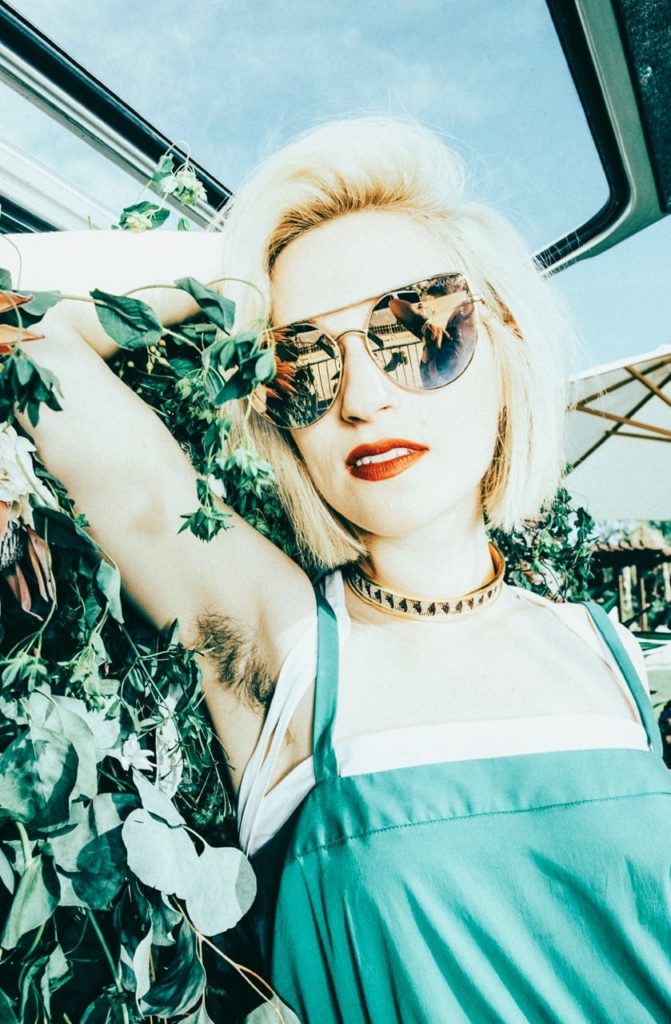
GK: Send it to me because I’m having an armpit problem. My body is rejecting deodorant. Like, I have rashes. So I switched to Thai crystal, which is this crunchy, hippie-dippie granola salt crystal that doesn’t really work that well. But I accidentally got addicted to a $300 moisturizer. It’s awful. But it’s the best thing I’ve ever used in my life. And I’ve just decided that this is the thing I spend money on.
AM: So obviously there’s been a big reckoning over the past year in terms of holding problematic media figures accountable and demanding representation. However, the invisible, non-forward-facing higher-ups at the tippity top of these companies continue to be shitty, and nobody even knows they exist, so why would they change? What do you think the future of digital and print media looks like? And you can speculate about this in as a dystopian way as you want.
GK: Ha. Yeah. I think it’s all going to die. And I think it has to. I think the punishment for not listening to what readers want is death. As a content creator, your number one job is to meet people where they’re at. And if you’re not interested in doing that, if you are 10 years late to the internet and 10 years late to social media, people are going to move on without you. And that’s what they’re already doing. I do think new media will pop up in its place, and it will be youth-driven and probably social-oriented. But I think the fact that the only content businesses doing well are streaming platforms is really telling.
AM: Yeah, it’s funny, I don’t even consume “women’s media” anymore. I get all that stuff from Instagram and TikTok. Okay, so here’s what my next question says verbatim: You’re a lesbian icon — what is your pie in the sky hope for the future of LGBTQ+ media?
GK: Um, thank you. I would love for media representation to be at the same percentage as the population is. Like I think we just deserve media that reflects the actual world, and we’re nowhere near that. And I think we deserve portrayals of nuanced, complicated, full characters who get to be challenged in the same way that straight people get to be challenged in fiction.
AM: Well, the world is thankfully getting gayer every day, so it would only make sense to see more queer media.
GK: That’s true. It’s in the water.
AM: In your book, you write very personally and vulnerably about your romantic relationships and eating disorders. Emotionally, what was the process of writing about these experiences like for you?
It was hard to not slip back into old habits while writing about my eating disorder, which is why I decided to not write about how I lost the weight because I knew that if I was having that impact on myself, then surely it would for someone else reading it. In terms of writing about relationships, it was just a struggle to figure out how much to divulge and how much to keep private. And like, even when it comes to people that I was really angry towards, I didn’t really want to slander them or have them be recognizable. Like they have their own stories to tell, and I’m not going to tell those stories for them. So I had to figure out where that line was — what was important for the narrative and what was just petty and like a lot of it was just petty, and I took that out.
AM: It’s so interesting because when you’re really angry at someone who you feel like really profoundly fucked you up, all you want is to seek revenge (or at least that’s just me), but when it gets right down to it and you have a pen in your hand, which really is mightier than the sword, you’re like, “Whoa, wait, do I want to be as damaging to this person as they were to me? No.”
GK: Oh yeah. Especially in the Brooklyn lesbian community… it’s a small world. Like my exes are still out there dating people. And I don’t want them to not find happiness. I don’t want to have every femme in Brooklyn be like, “You need to avoid this person.”
AM: That’s generous. What is the best and worst career advice you’ve ever been given?
GK: The best career advice I’ve ever been given was, “You’re never as stuck as you think you are.” And the worst career advice I’ve ever been given was, “You’re young. You don’t need to make money.”
AM: We love the consistency. We love loyalty. Final question: What’s the one thing you hope readers take away from your book? Like the one key feeling or notion you hope they’ll get when they close the final page?
GK: I hope that by me talking about the process of becoming disillusioned with all of the things that I was told my whole life I was supposed to want, that they can identify those things for themselves. And they can feel like, “Oh, this, this doesn’t feel right. I am allowed to leave it.” Whether that’s a relationship or a job, or a lifestyle habit. I hope that by reading about me doing that, they’ll have a similar lightbulb moment.
We only recommend products we have independently researched, tested, and loved. If you purchase a product found through our links, Sunday Edit may earn an affiliate commission.
